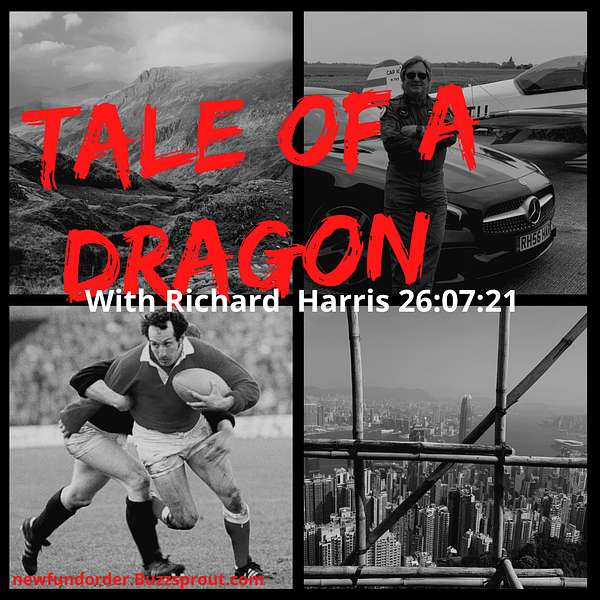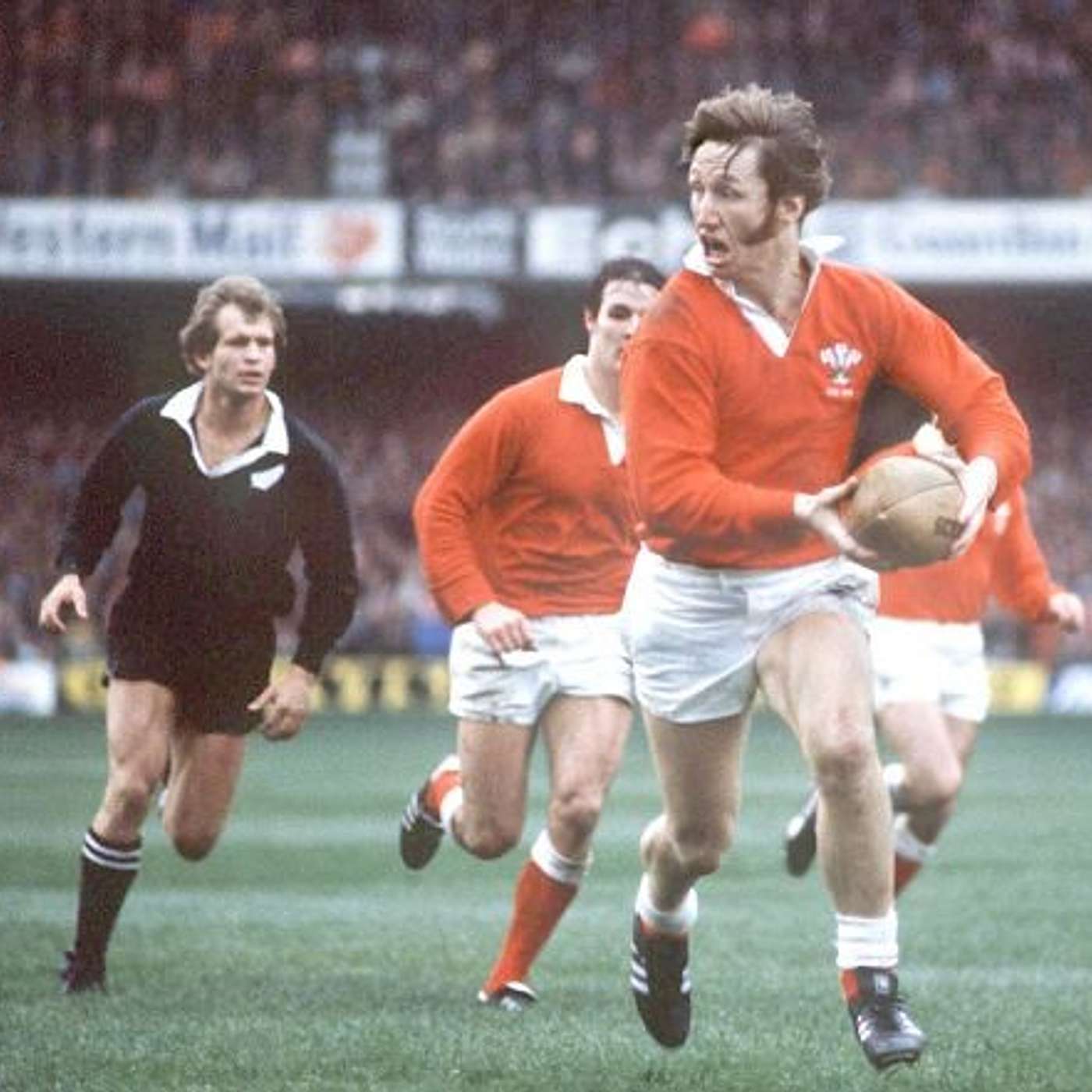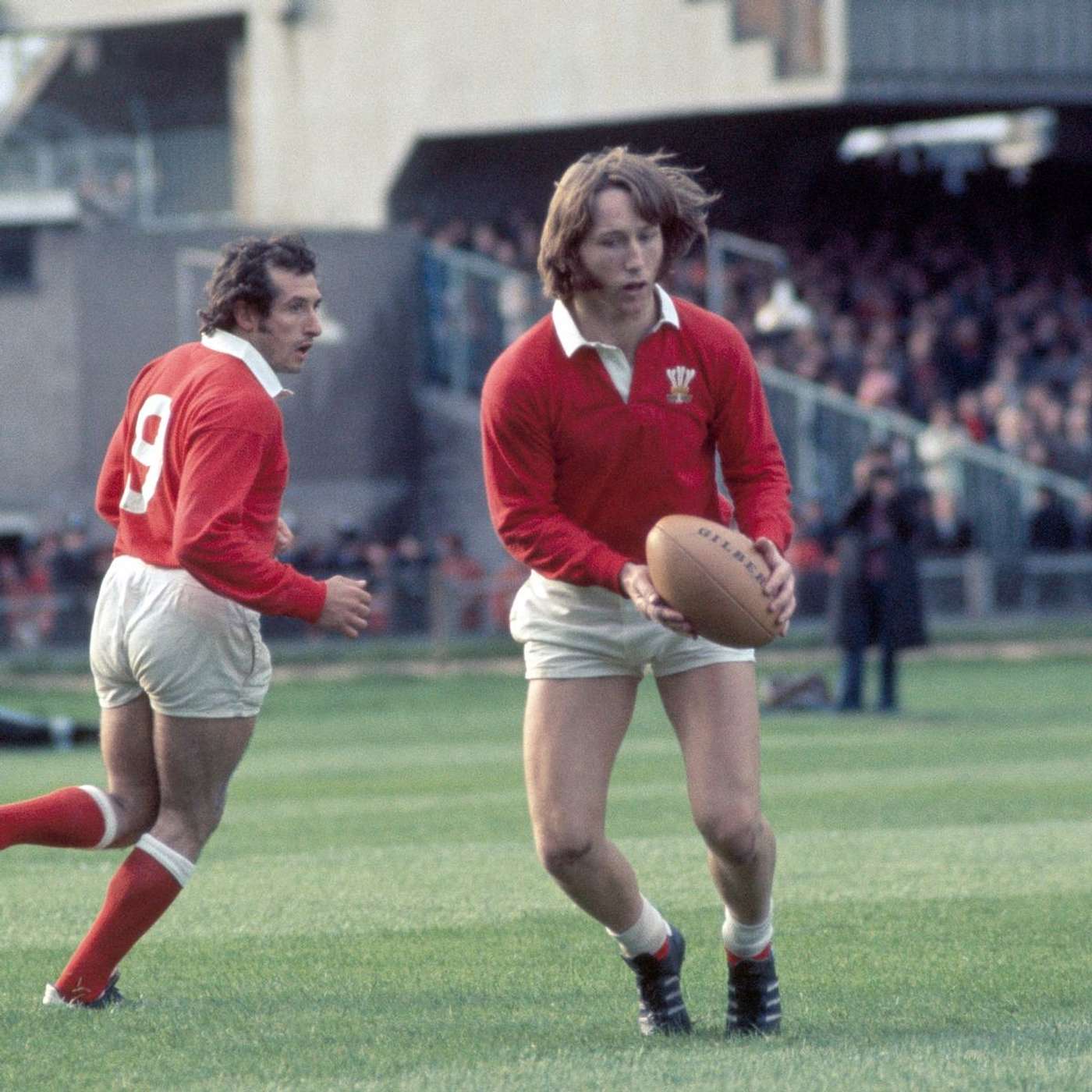
The New Fund Order
Deep from inside the City's shadows... author, speaker, NED and ex investment gatekeeper Jon 'JB' Beckett explores the Industry's taboo and hot topics. Dear Citizens of the People's Republic of Podcast, welcome! The New Fund Order is here; from existential risk to the human condition, a contrarian exploration of the Darkside, the Frontier and the Fringe of; Asset Management, Finance, Fintech, Mutual Funds and Macro. Bringing you news, views and interviews. Like a philosophy-economics mash up with science fiction, B-movies, Kung Fu films, cold war spy films, to Spaghetti Westerns... all delivered from the left-field with an Orwellian chill.. #newfundorder ALL VIEWS ARE INDEPENDENT. PLEASE check out my book website: https://www.blurb.co.uk/b/7337318-newfundorder-2-0 and Youtube channel https://www.youtube.com/channel/UClzN8gpccuVtdfW47TM_pPQ Season 2 ‘Fight Club’ is here ...
The New Fund Order
Tale of a Dragon: A Welshman in Hong Kong
Welcome to the New Fund Order. An Orwellian journey into the Darkside, the Frontier and the Fringe of Finance.
Normal service resumed, as we catch up with Hong Kong veteran and Welshman Richard Harris of Port Shelter as to expand our appreciation for noise and narratives in markets. We cover;
Words: Truth, Bias, Noise and Narrative.. How do words and media change how investors think and react?
Asia: Philosophically and practically.. in the breakdown are there key differences in the way wealth is managed in Hong Kong and Asia to Europe? How does that impact the selection of fund managers?
Fiscal policy: G7, taxation. What trickle down effects do you see it having on markets and in turn funds? Inflation: Global inflation and regional variance. Are we facing into a new cycle of higher inflation and will central banks freeze from raising rates leading to a collapse in real yields? Are Bond markets a bust? How should fund allocators hedge their portfolios from inflation scenarios?
Trade: Global free trade, is it in danger? How important is the Trans Pacific trade agreement and bringing U.K. into that trading scrum? How does US and China best play U.K. and Europe?
Macro: Capital flows into and out of China, is China ascending US as the global leader economically, and from there in Financial markets? Is the world now chasing the tail of the Dragon?
Equities: Has the question in global equities become too narrow and binary on the fortunes of Big US Tech, should fund allocators be going wide and looking to the wings to run the ball...
Excerpt;
"How noise affects the decisions we make
Truth, bias, noise and narrative. by Richard Harris
It is now a truth universally accepted that opinions and decisions are made both intuitively fast and analytically slow. Daniel Kahneman’s book “Thinking Fast and Slow” revolutionised how we think about how we think. For those looking to wade through Kahneman’s small-print, 500-page life’s work, I recommend starting with Michael Lewis’ book “The Undoing Project”, which explains the relationship between “Danny” and his friend and collaborator Amos Tversky. Amos sadly died before he could receive the Nobel Prize that he would have won with Kahneman in 2002.
..The good news is that most of our decisions are close enough right. Armed with Kahneman’s ideas, we can better optimise them if we are aware of those narratives which are so noisy that they are (from Macbeth), “a tale told by an idiot, full of sound and fury, signifying nothing.”
Richard Harris is Chief Executive of Port Shelter Investment and is a veteran investment manager, banker, writer and broadcaster and financial expert witness.
Credits;
George Orwell 'Nineteen-Eighty Four', Public Domain 1.0.
Source: BBC.co.uk. A small choir of unidentified Welsh miners perform two pieces for your entertainment. Their first song is a Welsh hymn entitled 'Ebenezer' ('Ton-y-Botell'). Taken from a 1936 programme called 'Street Show', this recording was made in the BBC Concert Hall at Broadcasting House in London. Originally broadcast 14 December 1936. Public domain 1.0. Additional Sound effects by Soundbible.com. Creative Commons Attribution 3.0 and Public Domain 1.0. All additional Music used by Silvermansound.com Attribution 4.
Active is: Allianz Global Investors.
Disclaimer: This post contains affiliate links. If you make a purchase, I may receive a commission at no extra cost to you.
JB Beckett 0:15
Salutations Dear citizens as we peer into the new fund order, discover the immutable truth for asset management and wealth managers. The lowdown from the dark side the frontier on the fringe of asset management fund research.
A podcast for wealth managers fund selectors, distributors and investors bring it to you the People's Republic, podcast or finance, in association with my sponsor Allianz global investors, capturing the latest market news views and interviews with leading minds in our industry.
Allianz global investors is one of the world's leading active managers.
In these strange pandemic lockdown times, rest assured that all guests are calling in remotely interview and welcome Richard to the new find order podcast. It's great to have you aboard to talk about a Welshman in Hong Kong, a tale of the dragon
Richard Harris 1:39
Well, thanks very much. It's, I know, I got you up very early to do this. But you're, you're used to that with me.
JB Beckett 1:45
Look, Richard, it's great to get you on the show. Other than obviously, your vast experience in investment management, you are a man of many facets, and you've decided to throw yourself into the academic system to explore I guess, you know, beyond heuristics, your PhD paper 'truth bias, noise and narrative'. So can I ask how do words and media change how investors think and react?
Richard Harris 2:11
Well, you know, I started as everybody does, basically looking at the, the the CFA idea, you know, look at optimization, looking at efficient market theory, look at capital asset pricing model, all great stuff, and all great, leading to understanding but, you know, obviously, as time goes on, you get much more interested in the behavioural side of things, you know, why was it when I was one of the largest investors in Hong Kong, Hong Kong, being ahead of everybody else, when all the brokers came in, in the morning, calling us for their first call, because we were the first people in that the share price had already moved when, when they called. And I just felt that there was a great deal more behind this whole behavioural, behavioural issue that was there that I hadn't really looked at before.
So I guess probably over the last 10 years, I've made a much more fundamental study. Doing a PhD was sort of unfinished business. I nearly did one when I was 20. And I think I was probably just about in line for a midlife crisis. I know you've got your motorbikes and I've got an error payments, anything like that, but I was, PhD is something I always wanted to do. And fortunately, as I'm more consulting now, it can be a bit more time to do it. But it just gives you time to read the stuff you thought you knew. So I thought I knew about the capital asset pricing model. Well, when you read bill Sharpe's stuff, you really understand what it's about, you know, the sheer sophistication behind it, but also the sheer simplicity behind it. And of course, that optimization doesn't take into account the fact that you've got people's feelings, people's emotions, various issues around that or of how you actually make decisions because, as fund managers, we're talking about making decisions with all this information.
So obviously, Daniel Kahneman's book 'Thinking Fast and Slow' is a key read for looking at biases, and heuristics. And that body of knowledge has just exploded, of course, and lots of jokes about how people do ridiculous things. But it's very difficult book to read, I would add and if you wanted a quick pop version, have a look at Michael lewis's book, 'The undoing project', which is about the friendship between Kahneman and Tversky, who were the two characters really behind the book. But what's interesting is there's still some other things out there that we don't really understand. And some of these are now starting to be talked about.
So Kahneman actually, literally in the last month, has just brought out a book about 'Noise'. And his view of noise is variability rather than the noise that investors looked at, but we'll come to that in a minute. His definition of noise is variability is very similar that if you've got a secret, a bunch of fund managers on the desk and you go Different managers managing different accounts, really with the same sort of objective, and you end up with fund managers, you know, some of them underperforming, some of them in line and some of them outperforming you. So think about guys who are on the same desk, getting the same information, talking to the same people, how is it you get this variability, because as well as biases, and those biases are included in that, we also get variability in terms of judgement and decision making. And a lot of that then flows through into the work that Robert Shiller has been doing on narratives recently with his 2019 book called narrative economics, on the basis of the fact that stories move markets. And as you know, I do quite a bit of talking head stuff, right. And it's always amazed me that you know, the stories move markets, many fund managers will say, Oh, I'm not gonna listen to the noise, I'm not gonna listen to the stories, the markets, I'm just gonna buy value, I'm just gonna buy growth. But it's no good buy value, if nobody wants to buy it, no good buying growth. If nobody wants to buy it, you have to understand the sentiment in the market. And that's often driven by the narratives in the market. And those narratives in the market do adjust and flow as they go along and sometimes go down Eddie's which everyone follows, Dare I mention ESG.
JB Beckett 6:26
Before I take you into a different area, because this is an area that seriously interests me. So when I was still at Franklin Templeton, I started doing some research into fund herding patterns, how has social media changed the noise and perhaps change some of those feedback, feedback loops in markets and how that's affecting investors?
Richard Harris 6:47
Well, that's very interesting in In fact, there's been relatively little research about that. Although there's been a great deal of research done on social media does social media move markets etc. And the research seems to kind of work out that it does have an impact on smaller stocks, of course, seen recently Game Stop.. BlackBerry, etc. Those kinds of stocks move, driven purely by social media. It sometimes also has an impact in say, emerging markets, we have smaller stocks, but the impact on bigger companies is much less focused. I think the thing is, if you're looking at a company like Boeing, which I'm doing a case study on at the moment, had hundreds of 1000s of tweets, just after the the two crashes or 737 crashes. But you have to think how much did those tweets really impact the stock market, compared to broker reports, compared to people looking at the news on Bloomberg compared to institutional investors and decision makers, making decisions with large amounts of money? It does look as if social media has influenced but maybe not as much as we think. At the end of the day, if you're a professional investor, are you going to get your information from Twitter, or you're going to get it from Bloomberg, Reuters, Refinitiv, etc, etc. And I think that professionals will still not be focusing on the social media side of it.
JB Beckett 8:20
And then when I've just had recently, I was interviewing Tom Chatfield. And one of the things he was talking about was this idea of 'surveillance capitalism'. And that technology and data is increasingly be used effectively to both monitor and manipulate. Noise goes from being effectively the benign to something that's perhaps a little bit more malignant.
Richard Harris 8:43
That's, that's interesting. I tell you, there's been quite a lot of research done on mobile telephone movements, and mobile telephone calls. So if there's a big sporting event, or so you can see these sorts of things. And sometimes if there's a big economic event, you can also see movements and these sort of things. It's not that easy to get that big data if you're, if you're even if you're a fund manager. And certainly not if you're an academic, you know, the second you come around Sam model purely for academic purposes, everybody clams up, one of my theories is that if you have an event in the stock market, the price moves very quickly. But the narrative starts developing after that. And very often the narrative comes through and people say, No, that's terrible. But the price has already moved, then is there some for castable information in that legacy narrative, that prior news that we could use to sort of at least build some scenarios to say, Well, if x happens, we're going to get a, b or c.
JB Beckett 9:45
It feels like we could we could devote the whole show to this and I think I'm going to have to get you back on Richard, so we can, we can explore this in a lot more detail. But I have a limited amount of time with you. And I want to ask you so many other questions.
And so, look as a, as a Welshman in Hong Kong first, how did how did that happen? But I think, moreover, as someone who has watched both in European and Asian markets, when you look at the I guess the key differences in the way wealth is managed in Hong Kong in Asia, versus Europe. What really stands out to you? And how might that impact the, I guess, the selection of fund managers?
Richard Harris 10:26
Well, we've had the classic issue of in Europe, I suppose wealth management, fund management really developed on the back of 'old money', money that needed to be invested on if you look at the stock exchange, you know, to 200 plus years of experience there. And also several generations that have gone through people who genuinely wanted their money managed just as you'd have an accountant or a doctor or a lawyer, you trusted that professional. In Asia, it was almost the other way round Asia has developed into a pretty mature banking sector. So the banks have basically driven it very transaction driven, day to day. So the clients tend to be very transaction driven. In addition to that first generation clients tend to be very transaction driven, you know, I've built this business so I can run my money as well.
I would say that 25-30 years ago, I was thinking, what a wonderful time this is because we're just set the stage where the wealth is being generated. And people are going to say, 'how am I going to manage my money properly and sensibly?', and 25 years later, it's extraordinary how little that still occurs, you know, for somebody to come to you and say, I'd like a sensible, risk adjusted portfolio, where I'm looking to make reasonable returns. But not everything, put everything on red three, that sort of attitude has not really reached Asia. And I think it's still some time yet before that's actually going to happen, people are still going to want to try and shoot the lights. We're talking a moment ago about satisficing,
I still think that it's good enough to have a reasonably sensible risk proportion portfolio, because I've seen a lot of people go massively leveraged into bull markets in Asia, and three or four cycles of the markets falling 50% have occurred in that time. So I've seen quite a lot of people make small fortunes out of big ones. Because they're there to leverage at the top and they think it's always going to carry on forever. Now, we've been lucky, the feds been pushing things for us to carry on forever. But that's not going to happen. And I think, you know, you still need to have sensible risk adjusted multi asset portfolios, if you've got significant wealth,
JB Beckett 13:04
You have your own podcast covering macro issues, Richard. So there's an opportunity here and excuse even to to give a shout out and perhaps discuss what are the I guess the burning topics you're discussing on your macro show?
Richard Harris 13:16
Yes, it's called 'Red Line Money', because we wanted to draw some red lines. And I'm doing it with David Roach, who is a real veteran of the investment markets and was at Morgan Stanley for many years. And both in Hong Kong, we both thought we do a podcast and we both try and find as much opportunity to disagree with each other. But yes, you're right. I mean, inflation has been key. Bitcoins been key, actually, I did a piece on non fungible tokens, looking at post pandemic issues, looking at, you know, where the bond markets going into the future, these sorts of things, always with an investment angle at the end, one of the interesting things coming through has been the impact of government and for some reason, we've strayed two or three times into just saying that, you know, as investors we have be aware these days that government is going to be more and more important.
JB Beckett 14:11
And as a as a fellow man of rrugger. And you actually still play which is not something I can lay claim to...
Richard Harris 14:17
Yes.
JB Beckett 14:18
Which is all the more...
Richard Harris 14:21
I'm 65 in in a few weeks time, and we've got at least four who are over 60 on the team. In fact, the fullback and the two wingers when I played I play on the wing actually, amazingly enough, because I never get the ball. Fullback on the two wingers. I think our total age was 186 a couple of weeks ago,
JB Beckett 14:43
I'm there for desperate opposites and throwing raga references and I was thinking about Brexit, which I'm sure you're you're following, which seems to have turned a bit of a maul. Where do you see the UK moving with the EU? How important is that Trans Pacific Partnership trading agreement to the UK. Where do you see the UK actually going from here?
Richard Harris 15:04
Well, looking from Hong Kong, we have a very, very different perspective. UK is got what, 68 million people. What people forget is Thailand is about the same. There are about as many people in Thailand as there are Brits. Vietnam has 90 million people, just to mention two small countries in Asia. I think most of us who sit outside the UK find it very difficult on a macro version, to see how the UK can really compete.
Yes, TPP, things are quite nice. But you only have to look at the recent trade deal between China and Australia, where day one, they did a trade deal and everybody, you know, champagnes all around. And then the next day, China slapped over 200% tariffs on Australian wines. Because the Aussies hasd complained about something or other, it seems to me that we are moving much more into more cold war scenario, there are going to be two broad world poles, one that basically says 'state government is best' and the other that says, 'we want to remain a democracy'. And I don't think either one is a winner. Although the narrative in Asia is that Asia is booming, and the West is declining fast. I don't think that's the case. I think we're going to end up with two broadly competing blocks.
JB Beckett 16:32
Where does that tension leave Hong Kong, which is obviously within one of those poles is democracy, its institutions, its heritage is much more firmly aligned to the West. So how does that I guess reconcile itself for Hong Kong?
Richard Harris 16:45
Well, there are huge tensions, there are people leaving, professional people leaving, foreign firms leaving, they're moving out. But they're not moving out completely. So that, you know, a bank might stop recruiting in Hong Kong, but recruit in Singapore. So instead of having 60% of your staff in Hong Kong, you have on 40 in Singapore, you have 60 in Singapore, and 40 in Hong Kong. So Hong Kong is not going to go away, it's still going to be the gateway to China. And don't forget that, although there's a lot of tension on the political level, China and the West need each other deeply. China is an export economy, it needs to export, and the West needs those exports. China is just too big a volume too big a factory to turn on its head. So that's going that's going to remain.
But I think in terms of Hong Kong, we are going to become much more a Chinese city. I don't think economically it will declin because I think as we see the exit of 'foreigners', for want of a better word, we're going to see an influx of people from the mainland. There's a little bit of disquiet over the minimum global tax on the basis of the fact that our tax is 15%. Thank you very much. Oh, we charge everybody that. But it's 15%. And that is a perfectly sensible tax, that is quite attractive for people from the mainland, and people from elsewhere in the world to work here to set up our businesses here. What a global minimum tax impact that I think it remains to be seen how it's going to be enforced. I suspect not. So I think Hong Kong will survive. It'll be a city of China had become much, much, much more Mandarin orientated, as the foreigners leave, but there will still be a great deal of investment coming in. Because the investment prospects, the taxation prospects, fiscal prospects, still much better than Mainland China.
JB Beckett 18:43
Another I think big macro trend everyone's talking about right now, which of course, is global inflation. And within that the regional variance that we're seeing within global inflation. We've gone through such a long extended supercycle, particularly in the West of disinflation, we're now facing actually some real inflation for a change. And of course, most investors never worked through a period of high interest rates. How do you think global inflation is going to affect fund allocation decisions going forward?
Richard Harris 19:12
Yeah,
JB Beckett 19:12
does it mean bonds are a bust?
Richard Harris 19:14
I think bonds are bust. And I wouldn't really want to be near them. Because it seems to me that inflation has been grossly either mismanaged or underestimated or just not understood by the central banks. Inflation is a resultant of economic policy; it's not a target of economic policy. Inflation happens because of your policies. Policies don't happen because of inflation. And I think this... central banks were strikingly unsuccessful tried to get inflation up because it's a resultant. And I think there'll be strikingly unsuccessful trying to get inflation down. The key thing that you have to remember about inflation is it's purely based on expectations you and I probably just about old enough to remember... I remember when I bought my first house and I was gasumped twice, it was very annoying for young couples who just managed to get enough money together seen their dream house and then they have the house pinched away from them by somebody else. So there's probably no great system. But you're right. People are going to people who've never seen high inflation are going to have to get used to higher interest rates, which is going to be tough because central banks can't put interest rates up for fearing of destroying the economies,
JB Beckett 20:26
Particularly when you're in your 20s and 30s. You would essentially spend today on your expectation of what you earn tomorrow. And that's that's you were encouraged. You were encouraged. It was a it was a bonus led industry ...but let's finish with China and I guess that US-China tension which we're kind of touching on before, it does feel like the world is now chasing the I guess the 'tail of the dragon'. A proper stramash going on between between the two. And indeed a little bit of argie bargey if you if you recall those days,
Richard Harris 20:56
Bill McLaren
JB Beckett 20:57
Absolutely, Bill McLaren and, you know, everything else gravitates around those two poles.
Unknown Speaker 21:03
It strikes me that in the last six months, Europe has actually moved away from from a more favoured China position. It's the US, Australia, New Zealand seems to be a little bit more leaning towards China, but but it's only relative. I think the issue that China has had is that they have taken this strategy of wolf diplomacy, which is being very aggressive with everybody. And broadly, China's antagonised a number of people who had really needed as friends who'd could have brought into the fold the whole South China Sea issue is a Tinder pod, and has really inflamed relations to veer from Vietnam, Indonesia, to Malaysia, Philippines, of course. And then, you know, Taiwan is the obvious issue. There are a lot of people here that think Taiwan is possibly not far away from maybe having some kind of military attack by China. That would be purely political, there's absolutely no reason to do otherwise.
Richard Harris 22:06
But it's one of these perverse things that if China manages manages to settle into a steady state of relationship between the two, then between the US and China, then I think things will be fine. If China gets into trouble, there may be the Bismarck in an attitude of sort of saying, well, let's create a little argie bargey elsewhere, maybe in Taiwan or something, get everybody on site, again, big rise of nationalism. And, and that'll secure the place of the party. That's not to say that they will occur but at the moment, they are points of concern that I think are driving a lot of the discussion in this part of the world.
JB Beckett 22:48
Many European Western portfolios are heavily concentrated in US equities. Within that the are generally concentrated around US big tech, should fund allocators now be thinking about going wide, look to to invest perhaps more on the wing, are they right to continue to try and run the ball up the centre?
Richard Harris 23:09
Well, I think that you know, you only need a small amount of money to take from the centre to put it out on the wing to have some effect. The issue is that the world is now so so correlated, that, you know, are you going to get much protection these days by keeping some money in India or some money in Japan or places that are less favoured? And the answer probably is No.
JB Beckett 23:35
But before you go, Richard, I'm gonna give you the opportunity to convert your try. I'll be asking guests and every episode to answer my quick rapid fire round of 10 questions. It's gut feel one answer.
Richard Harris 23:48
I'm here to catch on I'm ready for kickoff. Just don't show me a yellow card.
JB Beckett 23:55
Understood not in the sin bin. Okay, let's start the rapid fire round question one bull or bear short term bull long term bear question to Bogle or Buffett?
Richard Harris 24:12
Ah. You know, I love jack Bogle. I think he was a very intelligent man. I think he knew exactly what he was doing with his whole sales thing. But bottom line, I think at the end of the day, you have to go for the underlying value, the underlying truth. And that's really what Buffett stands for.
JB Beckett 24:31
Good stuff. Question three, profit or planet?
Richard Harris 24:38
You know, it's very interesting having having been in Hong Kong a long time, and we have some very nice beaches and stuff here. Almost every little rock Nook or cranny around the coast is covered in plastic. It's extraordinary. I think you have to go for the planet.
JB Beckett 24:54
Yeah.
Richard Harris 24:55
These are quick, rapid fire answers, I'm afraid.
JB Beckett 24:58
That's alright. I'll just trip you out in post production. Don't worry about it.
On a similar vein.. Question 4: Divest or Engage?
Richard Harris 25:07
Divest or engage what?
JB Beckett 25:08
The naughty companies as if we want to put it in that respect ESG point of view,
Richard Harris 25:12
I'm really an engagement guy. I think I have to go for engagement, because I think divestment is going to help nobody.
JB Beckett 25:21
So should have said, when you asked me what that question refer to, should have said 'bonds'. Question five, lower cost or better value?
Richard Harris 25:30
I think you have to go for better value
JB Beckett 25:33
It's bogle-ing.
Richard Harris 25:35
Very, very good. But what I think that the ETF, the index fund, thing has done did focus people on staying in the market long term.
JB Beckett 25:45
Yeah, yeah.
Richard Harris 25:46
And that's how the system works.
JB Beckett 25:48
Which takes us actually quite nicely to question six, which is supertankers or boutiques?
Richard Harris 25:53
Well, I kind of like the boutiques, but you know, we're, we're in a high fixed cost business. And this is just driving the supertankers to become even bigger and super..
JB Beckett 26:04
takes us on to question seven.
This has not turned out to be quite the rapid fire round I was hoping for, but
Richard Harris 26:09
Well, that's what the cutting floor for
JB Beckett 26:13
question seven, Star managers are team players?
Richard Harris 26:16
So at the end of the day, you know, I think the team works.
JB Beckett 26:20
I think it was a lovely rugby analogy. And this will resonate with with you Richard that, quite often the backs get the glory, but they the forwards win the match?
Richard Harris 26:29
Well, I think I'm back. And that's probably true. But the most important thing about that is we don't get our shorts dirty, and our hair all messed out of place.
JB Beckett 26:40
Question 8. public or private.
Richard Harris 26:42
I think they're very different markets. If I said you advise a young person to get into the markets now I'd say go private. So bottom line is I think public markets are pretty hard work. And private markets are pretty interesting.
JB Beckett 26:56
Question number nine, we're almost we're almost we're almost at the 22
Richard Harris 27:01
Oh no just trying to enjoy myself.
JB Beckett 27:04
High growth or stable income?
Richard Harris 27:06
You know, I'm kind of a growth guy. I lived in Asia too long, probably for that.
JB Beckett 27:13
And the last question, we're there.. at the try line.
Richard Harris 27:18
And it's a while but I'm just reaching for it. white line fever.
JB Beckett 27:26
This is my favourite. And it's a bit lefty so I do apologise, but it's socialism or free markets,
Richard Harris 27:33
I'm a free market guy, the number of intelligent people who talk about the term market failure. There's no such term.
JB Beckett 27:41
And that takes us to the last bonus question. If you could pick a number between 11 and 40,
Richard Harris 27:48
This is Episode 14. And 14 is a very bad number in Chinese.
JB Beckett 27:53
Oh,
Richard Harris 27:53
why don't we do 14?
JB Beckett 27:55
Question 14. oh brilliant.. US or China?
Richard Harris 27:59
Yeah but to do what?
JB Beckett 28:01
How would you interpret it? It is US or China question mark? That is the question.
Richard Harris 28:06
Okay, I think I can'y answer that. It's not because
JB Beckett 28:10
because 'they' are listening
Richard Harris 28:11
Yeah, probably.
JB Beckett 28:11
Yeah. 'They'.
Richard Harris 28:13
Yeah, it depends what company is it depends, and I know too much about but I better have another one. What about 15?
JB Beckett 28:20
Question 15 is pretty safe. Question 15 is: digital or analogue?
Richard Harris 28:26
Digital. I'm a nerd.
JB Beckett 28:27
Please don't forget to Like and Share and Subscribe. You know, click the subscribe button, a new podcast every two weeks with a new guest. Stay tuned.
A big thanks to you dear listener for tuning in. Brought to you by my sponsor, Allianz global investors and a warm thanks to today's guest. Legally I am compelled to remind everyone that all views of this podcast are independent and do not belong to any affiliation or organisation. Just in case that was in any doubt.
Tune in for the next podcast every two weeks from the...
Computer 29:04
new fund order.
JB Beckett 29:05
Please subscribe, share, like and comment. Let me know what you think and what you'd like covered in future episodes. Until then, stay safe and keep it left field.
Transcribed by https://otter.ai







